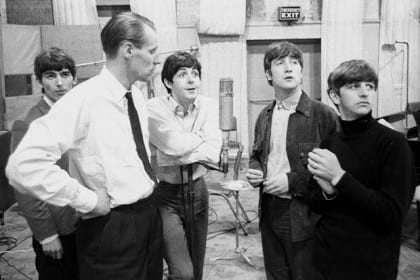
He was a GREAT man.
Thanks, George, for adding the polish and enabling the mind-blowing trimmings on Beatles songs, so much of the stuff that has made me content to spend long stretches of my life holed up in a dark room, listening to records.
I suspect you agree I’m a kinder, gentler, wiser Mr. Moderator. It’s not only apathy that’s kept me from saying anything about the sudden, premature death of founding Eagles member Glenn Frey. It’s also maturity. And increasing fear of The Reaper.
I hadn’t planned on posting any snarky thoughts Frey’s death, and I still won’t, but some Guardian piece lambasting people for mocking Glenn Frey’s death while celebrating David Bowie’s, which a friend posted on his Facebook feed has me feeling like, I don’t know, the meaner, harsher, more ignorant Mr. Moderator of old.
The holier-than-thou tone of the Guardian’s subtitle was enough to make my blood boil:
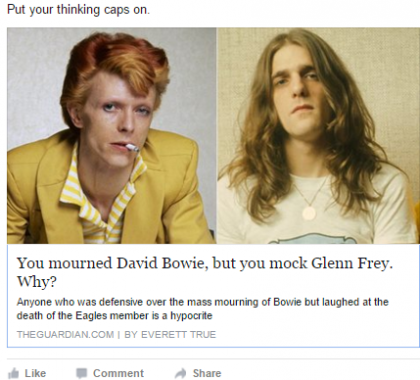

Hypocrite!
Who’s this Guardian writer to call younger, nastier, less-afraid-of-dying himself me a hypocrite? Call Younger Me and my ilk rude, immature, disrespectful…sure, but where does it say anyone needs to pretend that Bowie and Frey’s life works need to be considered on the same playing field? Can’t we be respectful while staying true to our own tastes and feelings? I tried, in my reply to my friend’s Facebook post. For the record, after being up there in his thread for nearly 12 hours, I have yet to receive a single Like. I’m not sitting by a large window, looking out at the rain, as a single teardrop rolls down my cheek, but I am a bugged enough to share my thoughts on the death and life of Glenn Frey. I hope my words help as you process this passing:
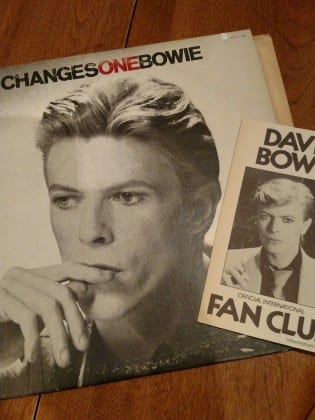

Just read that David Bowie died. Just this Saturday I was watching the Ziggy Stardust concert film and marveling at how fiercely his fans connected with him. I have spent years poking at the fact that, although I acknowledge his music is great and I love much of it, that I still couldn’t embrace Bowie. On New Year’s Eve this came up with old friends. I was reminded of the fan club insert that came with my copy of ChangesOne, one of the 3 greatest greatest hits albums in rock His fashion/mime thing never appealed to me and explained every gross misstep I would spot in a mostly excellent catalog. I used to wish he could just play music and stop making proto-Zoolander faces. What I’ve learned in just the last few years is that his entire Bowie thing wasn’t for my benefit – and that was OK. I finally realized how beautiful his thing was for the people he served. Beyond his excellent catalog, I’m glad to have him as a guide for people near and dear to me, and even as a guide for my own alien self.
As an American teenager, I first became aware of Cilla Black as a footnote to my all-encompassing Beatles education. When I got to college, long before the age of YouTube, let alone home computing and the Internet, I met a friend who owned the single of whatever song Paul McCartney threw her way. I remember it boring me, and I never heard another lick of Cilla Black until this week, when in London on vacation with my family and news broke that “Cilla,” as she’s known here, had died.
I had no idea she was so beloved in her home country. It was THE story on the news. There was some telemovie on her life that must have been made a few years ago that’s been running nonstop. In the pantheon of chubby-cheeked English singers, I figured she was a 1-hit wonder, nowhere near as beloved as likes of Lulu, Alison Moyet, the strawberry-blond Spice Girl, and all those other British women pop stars who run together in my mind, despite whatever decade in which they briefly burned brightest. Are the British more sentimental than I thought, or was Cilla Black really a relevant star beyond her footnote status in Beatles biographies?
She was a great…woman!
I just saw that Ornette Coleman has died. I’m not a jazzbo by any means, but he’s one of 3 jazz artists (mid-’60s John Coltrane and Bitches Brew-era Miles Davis) who first opened my thick head to the genre. I still think there’s something special about him, a floating, open quality to his music that goes down easy for me, that doesn’t raise my suspicions over the motives of those jazz chord–playing cats who’d previously failed to move me.
“I don’t want them to follow me,” he explained. “I want them to follow themselves, but to be with me.”
I will likely never understand the theory behind jazz music and Coleman’s harmelodics concept, but it felt like he and his bandmates were playing bits and pieces of nursery songs, devoid of the context of chords. Too much about life is surrounded by context, surrounded by chords. I still find it exciting to hear he and his mates blurt out their little sing-songy melodies. Sometimes they’re in unison, sometimes not. When the music of Ornette really works for me, it just sounds like kids playing on a schoolyard. “Ramblin’,” for instance, is like the sound of kids jumping rope or playing hopscotch.
It wasn’t always jump rope and hopscotch for Coleman. Another favorite is “Sadness,” from the stark Town Hall, 1962 album.
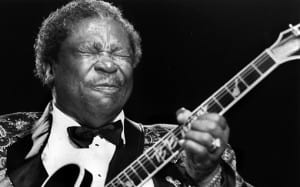

Legendary longtime Gibson guitar-mate Lucille has confirmed that blues legend B.B. King has died at the age of 89. I’ll be honest, my deep appreciation of King’s legendary blues status is limited to the standard 1-measure excerpt of the chorus of his legendary hit song, “The Thrill Is Gone,” the bit where he hits a legendary, mellow blues chord and sings the legendary line “The thrill is gone…”
I’m not proud of the fact that I’ve never tuned into the song beside that sole K-Tel ad-length snippet. I must have heard it all the way through a few times, but it made no impression on me. Whenever I saw King playing on late-night talk shows and gala events, I couldn’t get beyond the legendary, tuxedo-clad figure sweating out trills on his legendary Lucille, his eyes closed and his jowls shaking in ecstasy in response to his 2-measure lick, while seated on a chair.
My other bit of evidence of B.B.’s legendary contributions to the world of music came to me through his legendary contributions to U2‘s not-quite legendary blooz exercise, “When Love Came to Town.” Let’s face it: I couldn’t even begin to use the term “not-quite legendary” without B.B.’s 2-measure trills.
So listen, before you get mad at me and post “How dare you…!” replies, please let me know WHY I’m wrong in feeling like B.B. King was the Eric Clapton of the Blues, that is, the most highly regarded musician of his genre for little obvious evidence. I’m aware that the joke is probably on me, but I want to learn exactly why B.B. is due the following heartfelt, official remembrance:
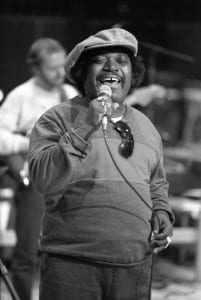

Singer Percy Sledge has died at 73, after an estimated 27,000 performances of “When a Man Loves a Woman.”
I used to think only so much of Sledge for his one big hit, no matter how great it was. It was overplayed by the time I was 15, and it inspired Procol Harum’s “Whiter Shade of Pale,” about which I’ve always had mixed feelings. About 15 years ago E. Pluribus Gergely and I saw him at a soul revue show at Atlantic City featuring Jerry Butler, Lloyd Price, and others. I’ve mentioned this show a few times before. Don Covay was in the audience, seated in our row, just a few people down from us!
EPG and I started to snicker as Percy waddled out in a tight-fitting tuxedo to sing his “one and only song.” (I know, I know, he made other records, some of which I’m sure are fine.) I expected him to come out like a wind-up doll, but a minute into the performance I felt he was still giving it his all. The performance moved me more than I could have imagined. That was the only song he sung that night, but he committed to it after god knows how many times he had to perform it. Pretty cool!